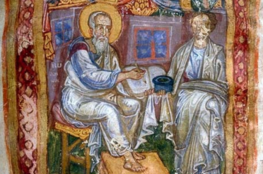Russian Orthodox Bishop Pitirim of Dushanbe and Tajikistan, in a provocative interview entitled “The Folly of Comfortable Christianity,” describes the phenomenon of “pink Christianity”:
Comfortable Christianity has always been around. But what I was talking about in my sermon was “pink Christianity”. This term appeared in the nineteenth century among the Slavophiles—thinking people who roused an interest in Christianity in an already quite secular society (similar to they way it was here in Russia at the end of the Soviet era), and there were people who wanted to live however they liked, denying themselves nothing, but nevertheless calling themselves Christians.
“Pink Christianity” is a kind of diluted Christianity. At the beginning of the twentieth century it led to renovationism, but fell under the grindstone of atheistic ideology. Not finding any response from the people it withered on the boundless spaces of the Soviet empire.
“Pink” or “comfortable Christianity” is not difficult to find, particularly in the West—a point Bishop Pitirim stresses during the latter part of his interview. The American iterations of “pink Christianity” can be found largely among the mainline Protestant confessions, although the Catholic Church is hardly immune. Desperate to find a way to get along in the world without dropping the Catholic moniker, both liberals and conservatives have been willing to genuflect before the altar of “American values.” Now the conservatives, faithful apologists of the tenets of the American ordo, find themselves falling under the grindstone of liberal ideology. The promise of “religious freedom” has faded and with each passing year this brand of American-style Catholicism finds itself unable to bring people to Christ. Instead it would rather bring them to elaborate indoctrination gatherings or secure them internships with second-rate think tanks which do little more than assure the powers of this world that it is possible to be a “good Christian” and a “good liberal,” meaning a good capitalist; a good consumer; a good apologist for shallow democratic politics; and so on and so forth.
There is, at this point, no safe haven in the modern world, a fact Bishop Pitirim is well aware of. Instead of discrediting his own message with the myth of neo-Holy Russia, Pitirim laments the loss of faith in his native land and the lack of zealousness for the Faith among the Orthodox. He expresses disappointment as well at the tendency of the Protestants to find excuses for certain sins—to justify them—in order to avoid the harder reality that they have nothing left to say to people ailing with vice. The Catholic Church, like the Orthodox, does have something to say, but unlike the Orthodox, its prelates don’t want to say it. So now instead of providing the faithful with the means of remaining firm in the Truth of Christ, the Pope of Rome convenes a Synod to discuss “pastoral” and “disciplinary” means to allow just the opposite. Bishop Pitirim doesn’t call direct attention to this lamentable reality, but perhaps he should.
Of course no Christian is perfect, not even the saints. We all falter. We all struggle. Sometimes we struggle for so long and against such seemingly impossible odds that we lose hope and fall into despair. Regrettably, in order to keep alive some semblance of hope, many Christians simply abandon the struggle, rationalizing to themselves—or, worse, being counseled by bishops and priests—that God does not care because He loves us. Yes, He does love us. He loves us so much that He sent his Son into the world to die an ignoble death for our Salvation. But we can still reject this gift. Christ will not drag us kicking and screaming into Heaven against our will, nor will He look kindly on those who consciously set aside their crosses to become “pink Christians.”



